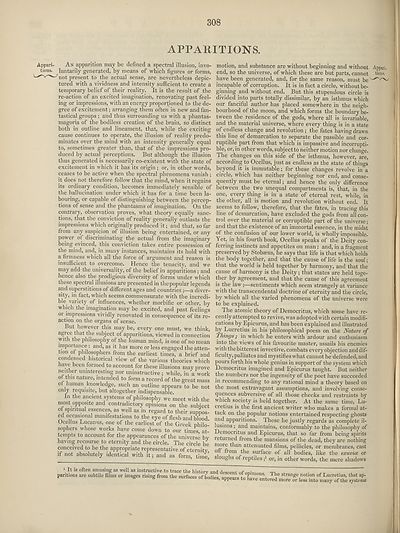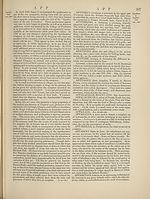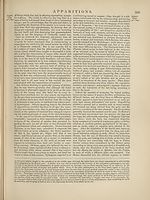Encyclopaedia Britannica > Volume 3, Anatomy-Astronomy
(316) Page 308 - Apparitions
Download files
Complete book:
Individual page:
Thumbnail gallery: Grid view | List view

308
APPARITIONS.
Appari- An apparition may be defined a spectral illusion, invo-
tions. luntarily generated, by means of which figures or forms,
not present to the actual sense, are nevertheless depic¬
tured with a vividness and intensity sufficient to create a
temporary belief of their reality. It is the result of the
re-action of an excited imagination, renovating past feel¬
ing or impressions, with an energy proportioned to the de¬
gree of excitement; arranging them often in new and fan¬
tastical groups ; and thus surrounding us with a phantas¬
magoria of the bodiless creation of the brain, so distinct
both in outline and lineament, that, while the exciting
cause continues to operate, the illusion of reality predo¬
minates over the mind with an intensity generally equal
to, sometimes greater than, that of the impressions pro¬
duced by actual perceptions. But although the illusion
thus generated is necessarily co-existent with the state of
excitement in which it has its origin; or, in other words,
ceases to be active when the spectral phenomena vanish;
it does not therefore follow that the mind, when it regains
its ordinary condition, becomes immediately sensible of
the hallucination under which it has for a time been la¬
bouring, or capable of distinguishing between the percep¬
tions of sense and the phantasms of imagination. On the
contrary, observation proves, what theory equally sanc¬
tions, that the conviction of reality generally outlasts the
impressions which originally produced it; and that, so far
from any suspicion of illusion being entertained, or any
power of discriminating the actual from the imaginary
being evinced, this conviction takes entire possession of
the mind, and, in many instances, maintains its hold with
a firmness which all the force of argument and reason is
insufficient to overcome. Hence the tenacity, and we
may add the universality, of the belief in apparitions ; and
hence also the prodigious diversity of forms under which
these spectral illusions are presented in the popular legends
and superstitions of different ages and countries ;—a diver¬
sity, in fact, which seems commensurate with the incredi-
ble. variety of influences, whether morbific or other, by
which the imagination may be excited, and past feelings
or impressions vividly renovated in consequence of its re¬
action on the organs of sense.
But however this may be, every one must, we think,
agree that the subject of apparitions, viewed in connection
with the philosophy of the human mind, is one of no mean
importance: and, as it has more or less engaged the atten¬
tion of philosophers from the earliest times, a brief and
condensed historical view of the various theories which
have been formed to account for these illusions may prove
neither uninteresting nor uninstructive ; while, in a work
of this nature, intended to form a record of the great mass
of human knowledge, such an outline appears to be not
only requisite, but altogether indispensable.
In the ancient systems of philosophy we meet with the
most opposite and contradictory opinions on the subject
of spiritual essences, as well as in regard to their suppos¬
ed occasional manifestations to the eye of flesh and blood
Ocellus Lucanus, one of the earliest of the Greek philo¬
sophers whose works have come down to our times at¬
tempts to account for the appearances of the universe by
having recourse to eternity and the circle. The circle he
conceived to be the appropriate representative of eternity,
if not absolutely identical with it; and as form, time’
motion, and substance are without beginning and without Appari.
end, so the universe, of which these are but parts, cannot tions.
have been generated, and, for the same reason, must be
incapable of corruption. It is in fact a circle, without be¬
ginning and without end. But this stupendous circle is
divided into parts totally dissimilar, by an isthmus which
our fanciful author has placed somewhere in the neigh¬
bourhood of the moon, and which forms the boundary be¬
tween the residence of the gods, where all is invariable,
and the material universe, where every thing is in a state
of endless change and revolution ; the fates having drawn
this line of demarcation to separate the passible and cor¬
ruptible part from that which is impassive and incorrupti¬
ble, or, in other words, subject to neither motion nor change.
The changes on this side of the isthmus, however, are,
according to Ocellus, just as endless as the state of things
beyond it is immutable; for these changes revolve in a
circle, which has neither beginning nor end, and conse¬
quently must be eternal; and hence the only difference
between the two unequal compartments is, that, in the
one, every thing is in a state of eternal rest, while, in
the other, all is motion and revolution without end. It
seems to follow, therefore, that the fates, in tracing this
line of demarcation, have excluded the gods from all con¬
trol over the material or corruptible part of the universe;
and that the existence of an immortal essence, in the midst
of the confusion of our lower world, is wholly impossible.
Yet, in his fourth book, Ocellus speaks of the Deity con¬
ferring instincts and appetites on man: and, in a fragment
preserved by Stobaeus, he says that life is that which holds
the body together, and that the cause of life is the soul;
that the world is held together by harmony, and that the
cause of harmony is the Deity; that states are held toge¬
ther by agreement, and that the cause of this agreement
is the law;—sentiments which seem strangely at variance
with the transcendental doctrine of eternity and the circle,
by which all the varied phenomena of the universe were
to be explained.
The atomic theory of Democritus, which some have re¬
cently attempted to revive, was adopted with certain modifi¬
cations by Epicurus, and has been explained and illustrated
by Lucretius in his philosophical poem on the Nature of
Things; in which he enters with ardour and enthusiasm
into the views of his favourite master, assails his enemies
with thebitterest invective, combats every objection and dif¬
ficulty, palliates and mystifies what cannot be defended, and
pours forth his whole genius in support of the system which
Democritus imagined and Epicurus taught. But neither
the numbers nor the ingenuity of the poet have succeeded
in recommending to any rational mind a theory based on
the most extravagant assumptions, and involving conse¬
quences subversive of all those checks and restraints by
which society is held together. At the same time, Lu¬
cretius is the first ancient writer who makes a formal at¬
tack on the popular notions entertained respecting ghosts
and apparitions. These he justly regards as complete il¬
lusions ; and maintains, conformably to the philosophy of
Democritus and Epicurus, that so far from being spirits
returned from the mansions of the dead, they are nothing
more than attenuated films, pellicles, or membranes, cast
o from the surface of all bodies, like the exuviae or
s oughs of reptiles or, in other words, the mere shadows
1 It is often amusing as well as instructive to trace the hiVnrv c ■
paritions are subtile films or images rising from the surfaces of bodies appearstoTaveenV ^ stran«e.noLion of Lucretius, that ap-
ui uouies, appears to have entered more or less into many of the systems
APPARITIONS.
Appari- An apparition may be defined a spectral illusion, invo-
tions. luntarily generated, by means of which figures or forms,
not present to the actual sense, are nevertheless depic¬
tured with a vividness and intensity sufficient to create a
temporary belief of their reality. It is the result of the
re-action of an excited imagination, renovating past feel¬
ing or impressions, with an energy proportioned to the de¬
gree of excitement; arranging them often in new and fan¬
tastical groups ; and thus surrounding us with a phantas¬
magoria of the bodiless creation of the brain, so distinct
both in outline and lineament, that, while the exciting
cause continues to operate, the illusion of reality predo¬
minates over the mind with an intensity generally equal
to, sometimes greater than, that of the impressions pro¬
duced by actual perceptions. But although the illusion
thus generated is necessarily co-existent with the state of
excitement in which it has its origin; or, in other words,
ceases to be active when the spectral phenomena vanish;
it does not therefore follow that the mind, when it regains
its ordinary condition, becomes immediately sensible of
the hallucination under which it has for a time been la¬
bouring, or capable of distinguishing between the percep¬
tions of sense and the phantasms of imagination. On the
contrary, observation proves, what theory equally sanc¬
tions, that the conviction of reality generally outlasts the
impressions which originally produced it; and that, so far
from any suspicion of illusion being entertained, or any
power of discriminating the actual from the imaginary
being evinced, this conviction takes entire possession of
the mind, and, in many instances, maintains its hold with
a firmness which all the force of argument and reason is
insufficient to overcome. Hence the tenacity, and we
may add the universality, of the belief in apparitions ; and
hence also the prodigious diversity of forms under which
these spectral illusions are presented in the popular legends
and superstitions of different ages and countries ;—a diver¬
sity, in fact, which seems commensurate with the incredi-
ble. variety of influences, whether morbific or other, by
which the imagination may be excited, and past feelings
or impressions vividly renovated in consequence of its re¬
action on the organs of sense.
But however this may be, every one must, we think,
agree that the subject of apparitions, viewed in connection
with the philosophy of the human mind, is one of no mean
importance: and, as it has more or less engaged the atten¬
tion of philosophers from the earliest times, a brief and
condensed historical view of the various theories which
have been formed to account for these illusions may prove
neither uninteresting nor uninstructive ; while, in a work
of this nature, intended to form a record of the great mass
of human knowledge, such an outline appears to be not
only requisite, but altogether indispensable.
In the ancient systems of philosophy we meet with the
most opposite and contradictory opinions on the subject
of spiritual essences, as well as in regard to their suppos¬
ed occasional manifestations to the eye of flesh and blood
Ocellus Lucanus, one of the earliest of the Greek philo¬
sophers whose works have come down to our times at¬
tempts to account for the appearances of the universe by
having recourse to eternity and the circle. The circle he
conceived to be the appropriate representative of eternity,
if not absolutely identical with it; and as form, time’
motion, and substance are without beginning and without Appari.
end, so the universe, of which these are but parts, cannot tions.
have been generated, and, for the same reason, must be
incapable of corruption. It is in fact a circle, without be¬
ginning and without end. But this stupendous circle is
divided into parts totally dissimilar, by an isthmus which
our fanciful author has placed somewhere in the neigh¬
bourhood of the moon, and which forms the boundary be¬
tween the residence of the gods, where all is invariable,
and the material universe, where every thing is in a state
of endless change and revolution ; the fates having drawn
this line of demarcation to separate the passible and cor¬
ruptible part from that which is impassive and incorrupti¬
ble, or, in other words, subject to neither motion nor change.
The changes on this side of the isthmus, however, are,
according to Ocellus, just as endless as the state of things
beyond it is immutable; for these changes revolve in a
circle, which has neither beginning nor end, and conse¬
quently must be eternal; and hence the only difference
between the two unequal compartments is, that, in the
one, every thing is in a state of eternal rest, while, in
the other, all is motion and revolution without end. It
seems to follow, therefore, that the fates, in tracing this
line of demarcation, have excluded the gods from all con¬
trol over the material or corruptible part of the universe;
and that the existence of an immortal essence, in the midst
of the confusion of our lower world, is wholly impossible.
Yet, in his fourth book, Ocellus speaks of the Deity con¬
ferring instincts and appetites on man: and, in a fragment
preserved by Stobaeus, he says that life is that which holds
the body together, and that the cause of life is the soul;
that the world is held together by harmony, and that the
cause of harmony is the Deity; that states are held toge¬
ther by agreement, and that the cause of this agreement
is the law;—sentiments which seem strangely at variance
with the transcendental doctrine of eternity and the circle,
by which all the varied phenomena of the universe were
to be explained.
The atomic theory of Democritus, which some have re¬
cently attempted to revive, was adopted with certain modifi¬
cations by Epicurus, and has been explained and illustrated
by Lucretius in his philosophical poem on the Nature of
Things; in which he enters with ardour and enthusiasm
into the views of his favourite master, assails his enemies
with thebitterest invective, combats every objection and dif¬
ficulty, palliates and mystifies what cannot be defended, and
pours forth his whole genius in support of the system which
Democritus imagined and Epicurus taught. But neither
the numbers nor the ingenuity of the poet have succeeded
in recommending to any rational mind a theory based on
the most extravagant assumptions, and involving conse¬
quences subversive of all those checks and restraints by
which society is held together. At the same time, Lu¬
cretius is the first ancient writer who makes a formal at¬
tack on the popular notions entertained respecting ghosts
and apparitions. These he justly regards as complete il¬
lusions ; and maintains, conformably to the philosophy of
Democritus and Epicurus, that so far from being spirits
returned from the mansions of the dead, they are nothing
more than attenuated films, pellicles, or membranes, cast
o from the surface of all bodies, like the exuviae or
s oughs of reptiles or, in other words, the mere shadows
1 It is often amusing as well as instructive to trace the hiVnrv c ■
paritions are subtile films or images rising from the surfaces of bodies appearstoTaveenV ^ stran«e.noLion of Lucretius, that ap-
ui uouies, appears to have entered more or less into many of the systems
Set display mode to:
![]() Universal Viewer |
Universal Viewer | ![]() Mirador |
Large image | Transcription
Mirador |
Large image | Transcription
Images and transcriptions on this page, including medium image downloads, may be used under the Creative Commons Attribution 4.0 International Licence unless otherwise stated. ![]()
| Encyclopaedia Britannica > Encyclopaedia Britannica > Volume 3, Anatomy-Astronomy > (316) Page 308 - Apparitions |
|---|
| Permanent URL | https://digital.nls.uk/193761456 |
|---|
| Attribution and copyright: |
|
|---|---|
| Shelfmark | EB.16 |
|---|---|
| Description | Ten editions of 'Encyclopaedia Britannica', issued from 1768-1903, in 231 volumes. Originally issued in 100 weekly parts (3 volumes) between 1768 and 1771 by publishers: Colin Macfarquhar and Andrew Bell (Edinburgh); editor: William Smellie: engraver: Andrew Bell. Expanded editions in the 19th century featured more volumes and contributions from leading experts in their fields. Managed and published in Edinburgh up to the 9th edition (25 volumes, from 1875-1889); the 10th edition (1902-1903) re-issued the 9th edition, with 11 supplementary volumes. |
|---|---|
| Additional NLS resources: |
|

